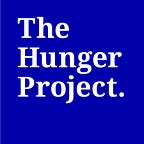The War in Ukraine is Impacting Africa’s Economies. We will Adapt & Overcome.
By Daisy Owomugasho, East Africa Regional Director, The Hunger Project
Last month, the UNDP published a report on the devastating effects the Ukrainian war is having on African livelihoods. The report added another worrying layer to the mountain of claims regarding the war’s role in rising poverty rates and pushing an additional 47 million people into acute hunger worldwide. Compounded by the effects of the COVID-19 pandemic, the report concludes that due to the war, the 2030 Sustainable Development Goals and the African Union’s Agenda 2063 are becoming increasingly out of reach.
People living with high levels of hunger and poverty, both in urban and rural areas, are being hit especially hard due to the over-reliance of African economies on Russian and Ukrainian imports. Between 2018 and 2020, Africa imported $3.7 billion in wheat (32 percent of the continent’s total wheat imports) from Russia and another $1.4 billion from Ukraine (12 percent of the continent’s wheat imports). This dependency has been especially visible since the onset of the war, as the price of Brent oil and fertilizer have increased by 25% and 21%, respectively. On top of this, the FAO’s food price index is at its highest point ever, pointing not only to an ongoing crisis, but also to a major setback in ending hunger.
As a development professional in Uganda, I’m seeing the impact of this firsthand. War-related trade restrictions and the rising price of fuel are having ripple effects on the rest of the economy, with a multidimensional impact on people’s livelihoods. For example, the price of wheat products such as bread and vegetable oils have already more than doubled, while the rising price of other basic necessities, such as soap, is having a wider detrimental impact on health and hygiene. The Ugandan President is even calling on the adaptability of his people to counter these alarming prices by urging the population to switch from eating bread to cassava.
I am hopeful that Africa’s rich informal sector may cushion some of the shock. The flexibility that makes the sector thrive will be key to facing this crisis, much like during the COVID-19 pandemic. As we saw a few years ago, African economies and populations can adapt and rise to new challenges. We have the benefit of a vibrant and young population who are keen to grow and support the continent as it navigates the future.
African civil society is just as vibrant as our youth. Civil society offers a space where people can come together to share interests and common goals. It also offers a means to challenge the failings of current systems and find alternative policies for government, the private sector, and other institutions to improve society. For instance, advocacy campaigns have been launched to reduce government taxes on fuel which would reduce prices at the pump for the people. There has also been increased advocacy for governments to increase their budgets for agriculture, and nutrition to counterbalance rising food prices.
However, I must note that the rippled impact of the war is affecting civil society, due to the increased cost of providing services. Fuel prices are wiping out some of the earlier planned budgets for travel and transport in organizations. This has a knock on effect on the costs of running earlier programed activities which are expected to increase, heavily limiting the opportunities of the people depending on them.
A reduction in civil society’s ability to operate will have long-term impact on the world’s ability to meet our greatest challenges.
The UNDP report recommends reducing dependency on external actors and promoting regional integration. The Hunger Project is working with communities to do this at the hyper-local level around the world and I have witnessed firsthand how truly empowering becoming sustainably independent can be for a community. Here in Uganda, we are working with farmers to move from chemical-based agriculture to chemical-free agro-organic farming. This reduces their reliance on fertilizers and other agro-inputs and increases the biodiversity in their communities. This work, which began in 2018, has proven to be successful in sheltering smallholder farmers from global shocks like the one we are experiencing today.
Nevertheless, it is now more important than ever to support each other locally, and internationally.
Dr. Daisy Owomugasho is the Regional Director for East Africa and she has served as Country Director for The Hunger Project-Uganda since February 2011. The Hunger Project is a global organization a global development organization that transforms the systems of inequity that keep hunger in place.
